Related Research Articles

A cuboctahedron is a polyhedron with 8 triangular faces and 6 square faces. A cuboctahedron has 12 identical vertices, with 2 triangles and 2 squares meeting at each, and 24 identical edges, each separating a triangle from a square. As such, it is a quasiregular polyhedron, i.e. an Archimedean solid that is not only vertex-transitive but also edge-transitive. It is radially equilateral.

In architecture, a cupola is a relatively small, most often dome-like, tall structure on top of a building. Often used to provide a lookout or to admit light and air, it usually crowns a larger roof or dome.
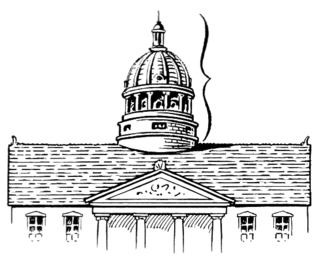
A dome is an architectural element similar to the hollow upper half of a sphere. There is significant overlap with the term cupola, which may also refer to a dome or a structure on top of a dome. The precise definition of a dome has been a matter of controversy and there are a wide variety of forms and specialized terms to describe them.

In geometry, the truncated cuboctahedron or great rhombicuboctahedron is an Archimedean solid, named by Kepler as a truncation of a cuboctahedron. It has 12 square faces, 8 regular hexagonal faces, 6 regular octagonal faces, 48 vertices, and 72 edges. Since each of its faces has point symmetry, the truncated cuboctahedron is a 9-zonohedron. The truncated cuboctahedron can tessellate with the octagonal prism.

In geometry, the square cupola, sometimes called lesser dome, is one of the Johnson solids. It can be obtained as a slice of the rhombicuboctahedron. As in all cupolae, the base polygon has twice as many edges and vertices as the top; in this case the base polygon is an octagon.

In geometry, the elongated square cupola is one of the Johnson solids. As the name suggests, it can be constructed by elongating a square cupola by attaching an octagonal prism to its base. The solid can be seen as a rhombicuboctahedron with its "lid" removed.

In geometry, the gyroelongated square cupola is one of the Johnson solids (J23). As the name suggests, it can be constructed by gyroelongating a square cupola (J4) by attaching an octagonal antiprism to its base. It can also be seen as a gyroelongated square bicupola (J45) with one square bicupola removed.
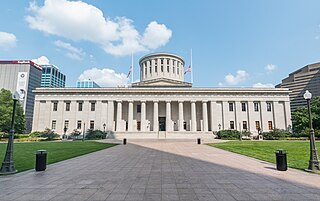
The Ohio Statehouse is the state capitol building and seat of government for the U.S. state of Ohio. The Greek Revival building is located on Capitol Square in Downtown Columbus. The capitol houses the Ohio General Assembly, consisting of the House of Representatives and the Senate. It also contains the ceremonial offices of the governor, lieutenant governor, state treasurer, and state auditor. Built between 1839 and 1861, it is one of the oldest working statehouses in the United States. The statehouse grounds include two other buildings, the Judiciary Annex or Senate Building, and the Atrium; the three are collectively referred to as the Ohio Statehouse into the present day.

The Abdul Gaffoor Mosque is a mosque in Little India, Singapore. It is located at Dunlop Street in the Rochor Planning Area.

The Ogle County Courthouse is a National Register of Historic Places listing in the Ogle County, Illinois, county seat of Oregon. The building stands on a public square in the city's downtown commercial district. The current structure was completed in 1891 and was preceded by two other buildings, one of which was destroyed by a group of outlaws. Following the destruction of the courthouse, the county was without a judicial building for a period during the 1840s. The Ogle County Courthouse was designed by Chicago architect George O. Garnsey in the Romanesque Revival style of architecture. The ridged roof is dominated by its wooden cupola which stands out at a distance.

The Hindu Gymkhana is a colonial-era building located on Sarwar Shaheed Road in Karachi, Pakistan. It was the first public building in Karachi to adopt the Mughal-Revival architectural style. It was established in 1925 by the Karachi's Hindus as an exclusive club for their community. The building houses the National Academy of Performing Arts.
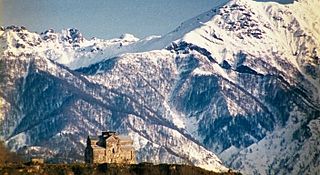
Bedia Cathedral is a medieval Georgian Orthodox cathedral located in Bedia, in the Tkvarcheli district of Abkhazia, a disputed region on the Black Sea coast.

Holy Mother of God Cathedral of Avan is a ruined 6th-century church located in the Avan District of Yerevan, the capital of Armenia. It is the oldest surviving church inside Yerevan's city limits.

The Union Church is a historic church on South Main Street in South Wolfeboro, New Hampshire, United States. Built in 1845 for the use of several small religious congregations, it is a well-preserved example of mid-19th century vernacular Greek Revival architecture. The building was listed on the National Register of Historic Places in 1982.

Sidi Mahrez Mosque, also known as Mohamed Bey El Mouradi Mosque, is a mosque in Tunis, Tunisia. It is an official historical monument.
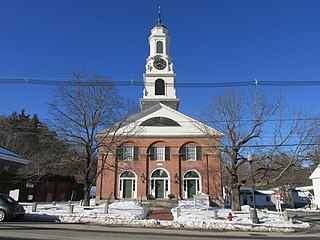
The Peterborough Unitarian Church, also once known as the First Church in Peterborough, is a historic American church at Main and Summer streets in Peterborough, New Hampshire. Built in 1825-26 for a congregation founded in 1752, it is one of the state's finest examples of a Federal period church, drawing inspiration from the publications of Asher Benjamin. The building was listed on the National Register of Historic Places in 1973.

The Old Grafton County Courthouse is a historic courthouse building at 1 Court Street in Plymouth, New Hampshire. This modest wood-frame building was built in 1774 to serve as one of two courthouses for Grafton County, which had just been established; it is one of the oldest surviving civic structures in the state. It is now the museum of the Plymouth Historical Society. The building was listed on the National Register of Historic Places in 1982, and included in the Plymouth Historic District in 1986.
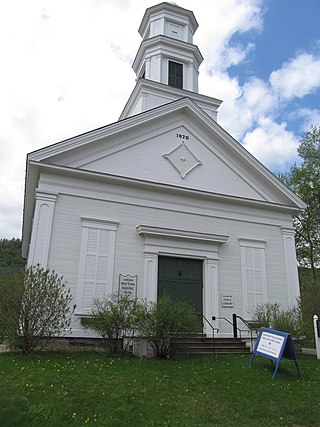
The Huntington Lower Village Church, also known historically as the Huntington Union Meeting House, is a historic church building at 2156 Main Road in Huntington, Vermont. Built in 1870, it is a fine late example of Greek Revival architecture. It now houses the Huntington Public Library and serves as a community center. It was listed on the National Register of Historic Places in 1984.

The Bab Doukkala Mosque or Mosque of Bab Doukkala is a major neighbourhood mosque in Marrakesh, Morocco, dating from the 16th century. It is named after the nearby city gate, Bab Doukkala, in the western city walls. It is also known as the al-Hurra Mosque.
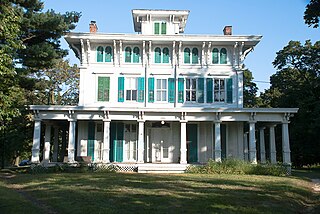
The Holmes–Tallman House is a large farmhouse with Carpenter's Italianate style located northwest of Jamesburg, at the corner of County Route 535 and County Route 522, in Monroe Township, Middlesex County, New Jersey. Also known as Brown's Corner House, it was added to the National Register of Historic Places on September 12, 1979, for its significance in architecture.
References
- ↑ Curl, James Stevens; Wilson, Susan (2016). Oxford Dictionary of Architecture. Oxford University Press. p. 804. ISBN 978-0-19-967499-2.